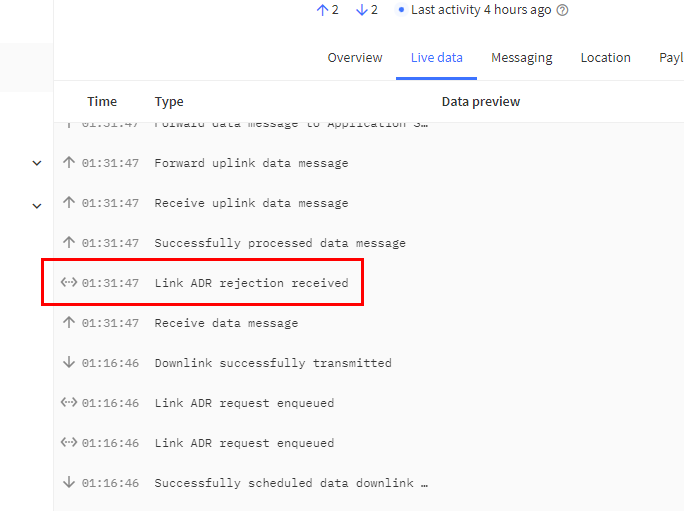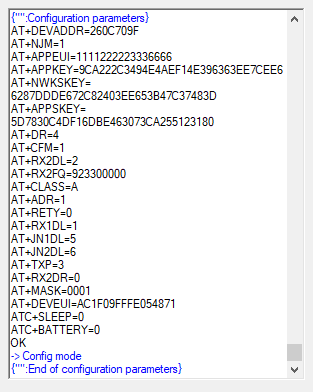this is my succesed processed data message, i deleted some information like keys.
`{
"name": "ns.up.data.process",
"time": "2023-05-09T14:33:04.602843323Z",
"identifiers": [
{
"device_ids": {
"device_id": "",
"application_ids": {
"application_id": "test-2stools"
},
"dev_eui": "",
"join_eui": "",
"dev_addr": ""
}
}
],
"data": {
"@type": "type.googleapis.com/ttn.lorawan.v3.UplinkMessage",
"raw_payload": "gE2mDCaABgAC/XurKwKMRBw=",
"payload": {
"m_hdr": {
"m_type": "CONFIRMED_UP"
},
"mic": "AoxEHA==",
"mac_payload": {
"f_hdr": {
"dev_addr": "",
"f_ctrl": {
"adr": true
},
"f_cnt": 6
},
"f_port": 2,
"frm_payload": "/XurKw==",
"full_f_cnt": 6
}
},
"settings": {
"data_rate": {
"lora": {
"bandwidth": 125000,
"spreading_factor": 8,
"coding_rate": "4/5"
}
},
"frequency": "916600000",
"timestamp": 3541664988
},
"rx_metadata": [
{
"gateway_ids": {
"gateway_id": "",
"eui": ""
},
"timestamp": 3541664988,
"rssi": -29,
"channel_rssi": -29,
"snr": 11.3,
"uplink_token": "ChoKGAoMODAwMjljYzc4ZTc0EggAAIACnMeOdBDcieaYDRoMCKCz6aIGEP2Y+LoBIOD2u92JpRY=",
"channel_index": 7,
"received_at": "2023-05-09T14:33:04.283191048Z"
}
],
"received_at": "2023-05-09T14:33:04.393510095Z",
"correlation_ids": [
"gs:conn:01GZXJB5DR8P0J5J7190ZNNHFT",
"gs:up:host:01GZXJB5J5KBHN95W291R0J3HT",
"gs:uplink:01H00EW6M8ZHRVBTV5WZFJT8ZP",
"ns:uplink:01H00EW6M95CTJQ82QFNHDCBNV",
"rpc:/ttn.lorawan.v3.GsNs/HandleUplink:01H00EW6M981DWWJQQ6161S186"
],
"device_channel_index": 7,
"consumed_airtime": "0.092672s"
},
"correlation_ids": [
"gs:conn:01GZXJB5DR8P0J5J7190ZNNHFT",
"gs:up:host:01GZXJB5J5KBHN95W291R0J3HT",
"gs:uplink:01H00EW6M8ZHRVBTV5WZFJT8ZP",
"ns:uplink:01H00EW6M95CTJQ82QFNHDCBNV",
"rpc:/ttn.lorawan.v3.GsNs/HandleUplink:01H00EW6M981DWWJQQ6161S186"
],
"origin": "ip-10-101-12-161.us-west-1.compute.internal",
"context": {
"tenant-id": "CgN0dG4="
},
"visibility": {
"rights": [
"RIGHT_APPLICATION_TRAFFIC_READ"
]
},
"unique_id": "01H00EW6TT91QJKESS6NAH7HEB"
}`
and this is the scheduled downlink message. Here its saying the downlink message is unconfirmed, should this be the problem?
`{
"name": "ns.down.data.schedule.attempt",
"time": "2023-05-09T14:35:04.806513474Z",
"identifiers": [
{
"device_ids": {
"device_id": "",
"application_ids": {
"application_id": "test-2stools"
},
"dev_eui": "",
"join_eui": "",
"dev_addr": ""
}
}
],
"data": {
"@type": "type.googleapis.com/ttn.lorawan.v3.DownlinkMessage",
"raw_payload": "YE2mDCYgDQBQZtb+",
"payload": {
"m_hdr": {
"m_type": "UNCONFIRMED_DOWN"
},
"mic": "UGbW/g==",
"mac_payload": {
"f_hdr": {
"dev_addr": "",
"f_ctrl": {
"ack": true
},
"f_cnt": 13
},
"full_f_cnt": 13
}
},
"request": {
"downlink_paths": [
{
"uplink_token": "
}
],
"rx1_delay": 1,
"rx1_data_rate": {
"lora": {
"bandwidth": 500000,
"spreading_factor": 8,
"coding_rate": "4/5"
}
},
"rx1_frequency": "926900000",
"rx2_data_rate": {
"lora": {
"bandwidth": 125000,
"spreading_factor": 12,
"coding_rate": "4/5"
}
},
"rx2_frequency": "923300000",
"priority": "HIGHEST",
"frequency_plan_id": "AU_915_928_FSB_1"
},
"correlation_ids": [
"gs:conn:01GZXJB5DR8P0J5J7190ZNNHFT",
"gs:up:host:01GZXJB5J5KBHN95W291R0J3HT",
"gs:uplink:01H00EZVT32FZNJXW68XFNNEKJ",
"ns:downlink:01H00EZW76WTMFCR38DXK9F7TE",
"ns:transmission:01H00EZW76X20KHV7JZJNZ83W6",
"ns:uplink:01H00EZVT5DAC76B8CTHQJNX4J",
"rpc:/ttn.lorawan.v3.GsNs/HandleUplink:01H00EZVT5CJ7A437DYQJ4MTB3"
]
},
"correlation_ids": [
"gs:conn:01GZXJB5DR8P0J5J7190ZNNHFT",
"gs:up:host:01GZXJB5J5KBHN95W291R0J3HT",
"gs:uplink:01H00EZVT32FZNJXW68XFNNEKJ",
"ns:downlink:01H00EZW76WTMFCR38DXK9F7TE",
"ns:transmission:01H00EZW76X20KHV7JZJNZ83W6",
"ns:uplink:01H00EZVT5DAC76B8CTHQJNX4J",
"rpc:/ttn.lorawan.v3.GsNs/HandleUplink:01H00EZVT5CJ7A437DYQJ4MTB3"
],
"origin": "ip-10-101-12-161.us-west-1.compute.internal",
"context": {
"tenant-id": "CgN0dG4="
},
"visibility": {
"rights": [
"RIGHT_APPLICATION_TRAFFIC_READ"
]
},
"unique_id": ""
}`


